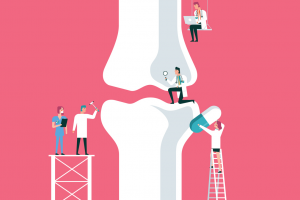
Prenatal PT and OT: How Europe Does It
Treatment GuidelinesI experienced this tragedy fifteen years ago, when one of my closest friends died in childbirth. Her death defied the statistics – she was a healthy, upper middle class woman and well-educated. It devastated me as a friend, but truly shocked me as a healthcare professional.
This blog was submitted by TherapySpark subscriber Wynnet Sinclair, Instructor of MOT Programs at the University of St. Augustine for Health Sciences. Do you have a unique story to share – about patient success, unique treatment techniques, or business outcomes? We want to hear from you!
According to a joint report from National Public Radio and ProPublica, more women in the United States die of pregnancy-related complications than in any other developed nation. Further, the United States is the only developed nation where women’s rate of pregnancy-related death is increasing. How can that be?
I experienced this tragedy fifteen years ago, when one of my closest friends died in childbirth. Her death defied the statistics – she was a healthy, upper middle class woman and well-educated. It devastated me as a friend, but truly shocked me as a healthcare professional.
With our advances in technology and research, why do our maternal and prenatal health outcomes fall behind? While there is no single or simple answer, when comparing women’s healthcare in the United States to other developed countries, some noticeable differences do emerge for consideration.
Free and Mandatory Preventive Care
As far as women’s health is concerned, many other developed countries have a better outlook. The data show this is especially true for maternal and prenatal health.
For women in other developed countries, preventive care comes in the form of prenatal classes and newborn wellness visits. Prenatal classes are free, and in some countries, they’re mandatory. Newborn visits are done in the home, so the new mother and baby don’t have to travel out to a clinic.
Additionally, in these countries, more pregnancies are handled by midwives than physicians. Midwives are highly specialized in maternal and prenatal and newborn care. They tend to take a broader, more holistic approach to maternal health and wellness.
Free Classes with Occupational and Physical Therapists
In addition to midwives, occupational and physical therapists (or physiotherapists) also play an important role in pregnancy. They teach the prenatal classes. Women don’t just learn how to tend to their babies, but they learn how to take care of themselves during and after the pregnancy.
My family that lives in Europe (Ireland, Great Britain, Germany, Switzerland, and Spain) say that all new mothers must attend prenatal classes. Topics include pelvic floor strengthening, birthing, newborn care, and breastfeeding.
Prenatal Classes for Pelvic Floor Strengthening
Carrying a baby can put so much stress on the pelvic floor that women experience leakage even before they give birth. Strengthening the pelvic floor helps women avoid urinary incontinence. In these classes, mothers learn how to keep their pelvic floor muscles strong during and after birth with Kegels and other exercises.
Prenatal Classes for Birthing
European birthing classes are like our Lamaze classes. Most women have a midwife deliver their baby – unless there are complications (like a Cesarean section). One of my sisters delivered three boys while she lived in England. Her birthing coach massaged her and taught her breathing techniques.
Prenatal Classes for Newborn Care
Most “how to care for your newborn” classes guide women in swaddling, sleeping, and colicky babies. One of my sister-in-laws in England said that everyone goes to 2-4 newborn care classes depending on which number baby it is for the mother. They usually take the first newborn care class at the hospital before discharge. Sine hospitals will not discharge a new mother without teaching her this class!
Prenatal Classes for Breastfeeding
I think that this class is fantastic! One of my cousins in Germany recently had her second child, and swears that having a baby there is such a treat! She received massages and automatically had a lactation consultant come to her hospital room – even on the weekend.
Here in the US, a weekend visit from a lactation consultant was out of the question for my cousin. She gave birth on a Saturday, requested a consultant, and could not get one for her two day stay. Another cousin is a nurse and lactation consultant. She teaches breastfeeding classes, but the classes are not free of charge.
Wellness House Calls
After a woman gives birth in some of these countries, a healthcare professional makes an actual house call. So, the new mother doesn’t have to take her newborn out of the house – imagine that! Mother and baby usually receive 2-3 home visits.
During the house call, the baby is weighed, and both mother and baby receive a wellness check to ensure that everyone is adjusting to their new lives at home. Women also benefit from a lactation or breastfeeding specialist who comes to the house – if the mother wants to breast feed.
Demands on Time and Productivity
As an occupational therapist in the United States, my productivity demands are consistently increasing. We’re continually pushed by management to see more patients in less time, every day.
With this time crunch, I gladly welcome the European philosophy of treating the individual for what I deem to be the appropriate amount of time.
My Experience
In my 20 years as an occupational therapist, I have found a passionate calling in women’s health, and I specialized in the pelvic floor. Through my studies, I was happy to learn that many countries understand the importance of educating women as a preventative method verses a reactive measure. Such methods could make a small dent in the United States’ pharmaceutical and surgical worlds.
Although therapy cannot cure everything, in women’s health it makes a tremendous impact and helps address most major issues – which is awesome. I’d like to see the United States follow these other countries’ examples and take a more proactive role in maternal and prenatal health to increase quality of life!
Wynnet Sinclair, OTD, OTR/L
Instructor of MOT Programs
University of St. Augustine for Health Sciences
Connect with Wynnet on LinkedIn





